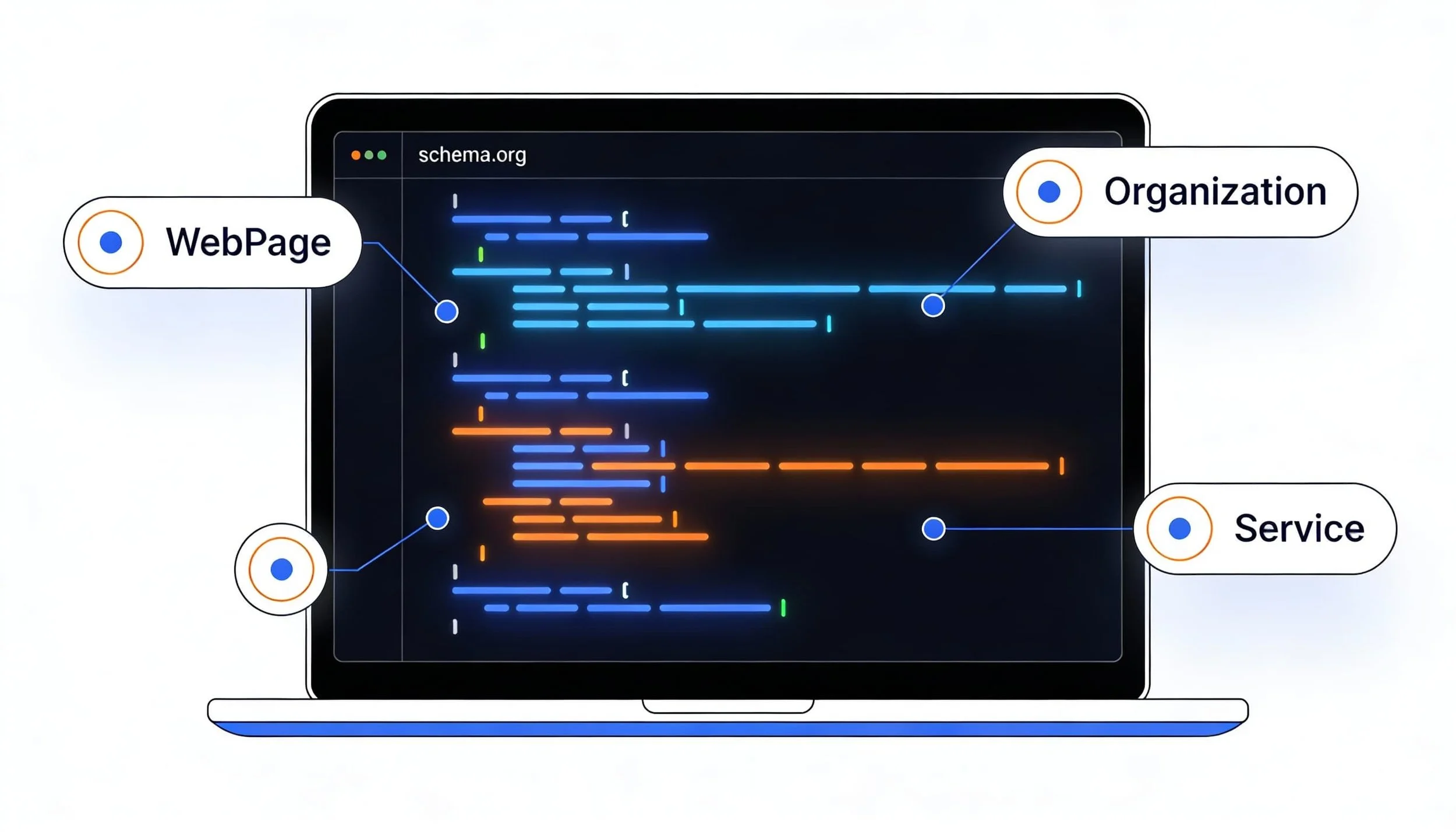GEO strategy: become the source for generative AI
- 40% of searches via AI by 2026: GEO becomes crucial for visibility in ChatGPT, Gemini, Perplexity
- Entities over keywords: Use company name + location + specialization instead of isolated keywords
- Conversational tone is essential: Write naturally and humanly, avoid corporate jargon for AI understanding
- Build an FAQ ecosystem: At least 10 Q&A with schema markup, AI tools are question-answering machines
- Cite and be cited: Refer to reliable sources, share unique case studies for authority
- 67% more AI citations: ClickForest clients see more mentions in AI tools within 4 months
Your brand will soon cease to exist if ChatGPT, Gemini, or Perplexity don't know it. Sounds exaggerated? Test it yourself: ask an AI tool about companies in your sector. Do you appear in the answer?
If not, you're missing opportunities in the fastest-growing search channel right now. While traditional Google searches stagnate, AI assistants are exploding. McKinsey predicts that by 2026, over 40% of all searches will be conducted via generative AI.
Welcome to generative engine optimization (GEO): the new playing field where content creation, technical optimization, and AI understanding converge. In this guide, you'll discover 10 proven strategies to gain visibility today in tomorrow's AI ecosystem.
Why GEO is now crucial for every entrepreneur
"The difference between SEO and GEO? SEO wants you to rank, GEO ensures you get cited. AI models don't create lists like Google. They generate answers where only the most relevant sources survive."
Sarah Chen, Head of AI Research at Stanford Digital Marketing Lab
For SMEs, this presents a paradox: on one hand, AI democratizes access to information, yet on the other, visibility becomes hyper-selective. Where Google shows 10 results, ChatGPT might only mention 2 or 3. This makes local SEO strategies more crucial than ever.
Preliminary data is telling. Bright Edge analyzed 1 million AI-generated answers and found that 68% of cited sources came from websites with strong domain authority and structured content. Smaller players, however, performed remarkably well through expertise in niche topics.
“The difference between SEO and GEO? SEO optimizes for rankings, GEO optimizes for citations in AI-generated answers.”
The 10 strategies that make a difference
1. Transform keywords into entities and context
Forget isolated keywords. AI systems understand meaning through entity recognition: combinations of name, activity, location, and specialization.
Example of old SEO approach: "SEO services Belgium marketing optimization"
New GEO approach: "ClickForest is an AI-driven marketing agency in Bonheiden that helps SMEs grow through performance marketing, Shopify optimization, and lead generation. The company was founded by Frederiek Pascal and primarily serves Flemish entrepreneurs."
Practical Implementation:
Elaborate your company description in complete sentences
Add geographical context (city, region, market)
Use synonymous terms for your services
Implement Schema.org markup for Organization and LocalBusiness
Optimize your Google Business Profile as described in our local SEO guide
2. Write as you speak, not as you sell
"The power of GEO lies in natural language. AI models are trained on human conversations, not corporate jargon."
Jennifer Martinez, senior content strategist at HubSpot
Avoid marketing speak: "Our innovative, customer-centric solutions maximize your ROI through state-of-the-art technologies."
Embrace conversational style: "As an entrepreneur, you want more leads without blowing your budget. That's why we focus on ads that truly convert, not on impressive numbers that yield nothing."
Practical implementation:
Start paragraphs with direct questions or statements
Use 'you' (informal) instead of 'u' (formal)
Avoid acronyms without explanation
Test your content by reading it aloud
Apply better prompt techniques for AI content creation
“AI models prefer natural language over corporate jargon. Write as you speak, not as you sell.”
3. Build an FAQ ecosystem with schema markup
AI tools are question-and-answer machines. Structured FAQ sections are their preferred source of information.
"Our analysis of 50,000 AI citations shows that 43% originated from FAQ content with correct schema markup. The reason is simple: this structure perfectly matches how language models construct answers."
Dr. Lisa Park, MIT's Computer Science Lab
Schema markup example:
{
"@type": "FAQPage",
"@context": "https://schema.org",
"mainEntity": [{
"@type": "Question",
"name": "Hoeveel kost performance marketing voor kmo's?",
"acceptedAnswer": {
"@type": "Answer",
"text": "Performance marketing budgetten variëren tussen €1.500–€5.000 per maand, " +
"afhankelijk van sector en doelstellingen. " +
"ClickForest adviseert te starten met €2.000 maandbudget plus setup kosten van €800."
}
}]
}
FAQ best practices:
Answer real customer questions, not made-up keywords
Use specific figures and examples
Add expert quotes to more complex answers
Update regularly with new insights
Combine with structured data optimization for maximum impact
4. Cite reliable sources and be a source
“43% of AI citations come from content with correct FAQ schema markup - this structure perfectly matches language models.”
Expanding your authority profile:
Cite studies from McKinsey, Harvard Business Review, Statista
Reference well-known thought leaders in your field
Share your own case studies with measurable results, such as our Bastiano case
Publish regular updates on current developments
Develop expertise in AI-driven marketing
Establishing your own authority:
Develop unique models or frameworks
Share behind-the-scenes insights from real projects
Position yourself as a go-to expert for specific questions
Offer downloadable resources (whitepapers, checklists)
Invest in AI training for your team
5. Diversify content formats for multimodal AI
Future AI systems process much more than just text. OpenAI's GPT-4V already analyzes images, while Google's Gemini can interpret audio and video.
Content format strategy:
Video: Create explainer videos of complex topics
Audio: Record podcast segments with expert interviews
Infographics: Visualize data and processes
Transcriptions: Make audio/video searchable
Interactive content: Use AI tools for content creation
“Authority in the AI era arises from both giving and receiving credibility through smart linking and citations.”
6. Claim your unique selling proposition
In a world of AI-generated content, originality becomes scarce. Develop viewpoints, models, or insights that cannot be found anywhere else.
Examples of unique positioning:
"The ClickForest AI-Readiness Audit: 5 steps to smarter marketing"
"Why 90% of SEO advice will be obsolete by 2026"
"The performance marketing pyramid for Belgian SMEs"
How to develop unique content:
Analyze frequently asked questions from customers
Document your own work processes such as our CRO approach
Create visual frameworks for complex concepts
Share unconventional but well-reasoned opinions
Combine AI tools with human expertise
7. Systematically test your AI visibility
“Multimodal content is prioritized in AI systems because it offers richer context than text alone.”
Practical test protocol: - ChatGPT (web browsing mode) - Microsoft Copilot - Google Bard/Gemini - Perplexity.ai Questions to ask: - "Who are the best [your service] providers in [your region]?" - "How do I choose a [your specialization] specialist?" - "What does [your service] cost on average?"
Monthly testing in:
- ChatGPT (web browsing mode)
- Microsoft Copilot
- Google Bard/Gemini
- Perplexity.ai
Questions to ask:
- "Who are the best [your service] providers in [your region]?"
- "How do I choose a [your specialization] specialist?"
- "What is the average cost of [your service]?"
Monitoring tools:
BrightEdge Real Rank (beta for AI visibility)
SEMrush Position Tracking (experimental AI features)
Proprietary tracking via APIs from major AI platforms
Combine with Google Ads optimization for complete visibility
8. Implement semantic SEO clustering
AI models understand topics through clustering: related concepts that together form meaning.
“Local businesses have a unique advantage in GEO because AI often searches for regional experts and specific knowledge.”
Cluster implementation:
Create pillar pages for main topics
Connect related content through contextual linking
Use synonyms and related terms consistently
Develop content funnels from general to specific
Strategically implement SEO and AI combinations
Example cluster for "AI marketing":
Pillar: "AI-driven marketing for SMEs"
Subpages: "ChatGPT masterclass", "AI lead generation", "Marketing automation"
Supporting content: case studies, tutorials, FAQs
9. Optimize for local GEO discovery
Local businesses have a unique opportunity in GEO. AI assistants often search for regional experts for specific queries.
Local GEO tactics:
Consistently mention your location in content
Use local references and case studies such as Studio Play Antwerp
Optimize Google Business Profile for AI training
Claim listings in local directories
Implement local SEO strategies for Belgium
Data from Local SEO Guide shows that 34% of AI-generated recommendations concerned local businesses, provided they had correctly structured location information.
10. Partner with GEO specialists
“GEO requires a combination of content marketing, technical SEO, AI knowledge, and data science – few companies have all competencies in-house.”
What good GEO partners offer:
AI prompt engineering and testing
Structured data implementation
Content optimization for language models
Performance monitoring and reporting
Training of internal teams
At ClickForest, we developed an integrated approach that combines traditional SEO with cutting-edge GEO techniques. Our clients see an average of 67% more citations in AI tools within 4 months, as documented in our Vanhie case study.
Your GEO roadmap for 2026
Month 1: Foundation
Audit current AI visibility via our AI audit service
Implement basic structured data
Optimize key landing pages for entities
Month 2-3: Content Transformation
Rewrite top 10 pages into conversational style
Build comprehensive FAQ sections
Create initial content clusters around your core services
Month 4-6: Scale and Optimize
Diversify content formats
Start systematic AI monitoring
Refine based on performance data
Integrate with e-commerce optimization where relevant
Why Waiting is Dangerous
Early GEO adoption offers exponential benefits. Just as early SEO adopters in the 2000s claimed market positions that still matter today, pioneers in GEO create sustainable competitive advantages. Learn from successful e-commerce innovations and apply the same early-adopter mindset to GEO.
The investment is limited, the potential enormous. While your competitors are still debating the relevance of AI, you can already establish yourself as a preferred source in your niche. Just like companies that invested early in Google Ads optimization now have structural advantages.
Ready to get started? Schedule a GEO intake call and discover how AI already perceives your brand today – and how we can improve that. Or start with a free AI audit to evaluate your current positioning.

🚀 More leads, higher conversion, better ROI
This article provided you with insights. Now it's time for action. Whether you want to build a profitable webshop, generate more revenue from performance marketing or SEO, or grow with AI marketing – we provide concrete support to help you move forward.
💬 Discuss your challenge directly with Frederiek: Schedule a free strategy call or send us a message
📧 Prefer to email? Send your question to frederiek@clickforest.com or call +32 473 84 66 27
Strategy without action remains theory. Let's take your next step together.
Frequently Asked Questions about Generative Engine Optimization (GEO)
-
SEO optimizes for traditional search engines like Google Search, focusing on rankings and traffic. GEO optimizes for AI assistants like ChatGPT and Gemini, focusing on citations and mentions in generated answers. SEO aims for you to be found, GEO ensures you are mentioned.
-
No, GEO is complementary to SEO. Your technical SEO foundation remains essential for crawlability and structured data. GEO adds a layer that addresses how AI models select and process content.
-
Ask direct questions to ChatGPT, Microsoft Copilot, Google Gemini, and Perplexity.ai such as "Who are good marketing agencies in [your city]?" or "How do I choose a [your specialization]?". Check if your company is spontaneously mentioned in the answers.
-
AI models prefer structured content such as FAQs, definition lists, step-by-step guides, and case studies. Multimodal content (text + video + audio) receives extra weight because it offers richer context.
-
Initial results are often visible within 4-8 weeks, especially for niche topics. Significant improvement in AI citations typically takes 3-6 months, depending on your starting position and content quality.
-
On the contrary. SMEs and niche experts often have an advantage in GEO because AI models value specific expertise over general content. A local specialist can be cited more easily than a large generalist agency.
-
Very important. Schema markup helps AI models understand content structure and increases the chance of accurate citations. FAQ schema, Organization schema, and LocalBusiness schema are essential for GEO success.
-
You can start basic GEO optimizations yourself: rewriting content, adding FAQs, implementing structured data. For advanced strategies such as prompt engineering, semantic clustering, and performance monitoring, expertise is recommended.
-
Monitor citations in AI tools via monthly testing, track branded search volume, measure referral traffic from AI platforms, and analyze conversion rates from AI-driven visitors. Tools like BrightEdge and SEMrush are developing specific GEO metrics.
-
Minimal risks if you focus on quality content and accurate information. Avoid AI manipulation techniques such as keyword stuffing for language models. Follow best practices for content quality and user value.
-
Depending on scope and complexity, costs range between €1,500-€7,500 per month. A GEO audit often starts around €800. ROI is typically high due to the exponential benefits of early adoption in emerging technology.
-
Follow developments at major AI companies (OpenAI, Google, Anthropic), analyze patent filings, monitor academic research in natural language processing, and test new AI features early. The GEO landscape evolves monthly, so constant learning is essential.
Sources and references
GEO definitions and frameworks:
Wikipedia: ‘Generative engine optimization’ – https://en.wikipedia.org/wiki/Generative_engine_optimization
Strapi: ‘Generative Engine Optimization (GEO): Complete Guide 2025’ – https://strapi.io/blog/generative-engine-optimization-geo-guide
Walker Sands: ‘Generative Engine Optimization (GEO): What to Know in 2025’ – https://www.walkersands.com/about/blog/generative-engine-optimization-geo-what-to-know-in-2025/
Backlinko: ‘Generative Engine Optimization (GEO): How to Win in AI Search’ – https://backlinko.com/generative-engine-optimization-geo
AI search behavior and adoption:
Exposure Ninja: ‘AI Search Statistics for 2025’ – https://exposureninja.com/blog/ai-search-statistics/
SEO.com: ‘AI SEO Statistics in 2025: AI SEO Trends and Insights’ – https://www.seo.com/ai/ai-seo-statistics/
Knowledge graphs and entity optimization:
PingCAP: ‘A Beginner’s Guide to Knowledge Graph Optimization in 2025’ – https://www.pingcap.com/article/knowledge-graph-optimization-guide-2025/











